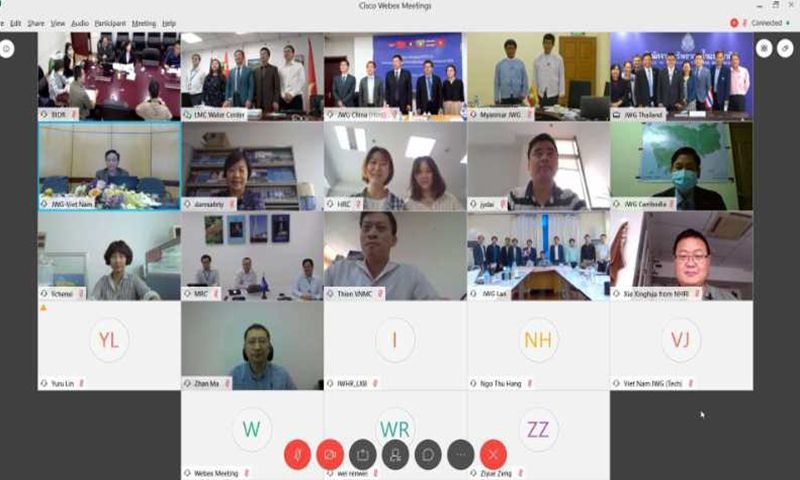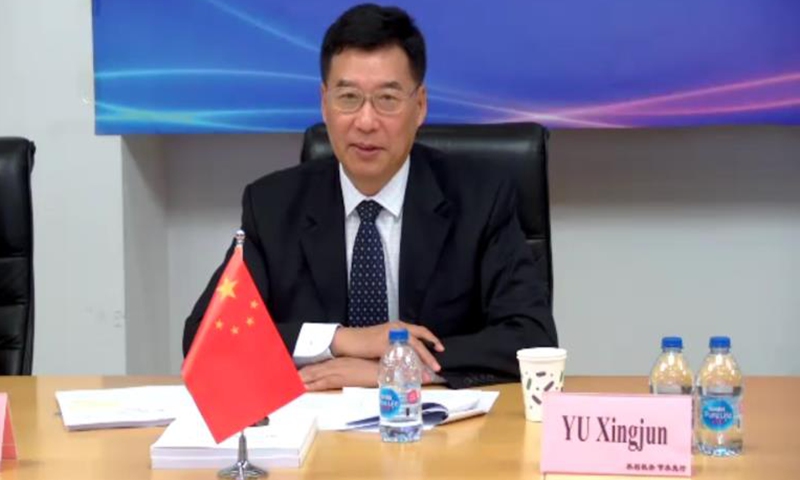Transparency and info-sharing valued by multilateral cooperative scheme benefiting states along Lancang-Mekong river

Screenshot of the online meeting joined by six countries located in the Lancang-Mekong River Basin on May 21. Courtesy: Lancang-Mekong water resources cooperation center
Representatives from six countries located in the Lancang-Mekong river basin joined an online meeting for the first time after the outbreak of the COVID19 pandemic on Thursday to facilitate dialogue on establishing an information sharing platform to boost transparency and cooperation in water resources management.
The officials attending the conference initiated by China initiated agreed that the coronavirus will not dampen their determination to participate in the Lancang-Mekong Cooperation (LMC) to boost regional sustainability.
The Chinese-built lower Stung Russei Chrum hydropower station, located in the jungles of Koh Kong province, southwestern Cambodia, for instance, has been kept smoothly running at full capacity during the COVID19 pandemic to provide reliable power for the socio-economic stability of Cambodia.
Proposed by Chinese Premier Li Keqiang in 2014 at the 17th China-ASEAN Summit, the LMC framework aims to bolster social and economic exchanges among the sub-regional countries - Cambodia, China, Laos, Myanmar, Thailand and Vietnam - narrowing the development gap between state members and advancing South-South cooperation altogether.
The project-oriented framework aims to serve as an example of innovative regional cooperation seeking a win-win across several areas including cross-border economies, water resources, agriculture and poverty reduction.
Originating from the Qinghai-Tibet Plateau in China, the Lancang-Mekong river, called the Lancang River for the part flowing through China, is a life-source for 60 million people.
Ministers of water resources of the six countries attach great importance to the development of the value of water resources in the region and have exchanged visits several times over past three years to contemplate a smarter way for water resources management among the state members.
A joint working group under LMC framework made up by the representatives from water authorities of six state members are mulling on an information sharing platform to be established soon and expect it to be accessible for both the public and government officials.
China values transparency the most and envisages the platform to serve as a real-time monitor to help deal with any emergency, especially in flood and drought mitigation or handling climate change, Yu Xingjun, head of the Chinese working group, said during the conference. Many countries show their support to the platform for fruitful proposed results.

Yu Xingjun, head of the Chinese working group, attends the online meeting to discuss Lancang-Mekong Cooperation (LMC) Courtesy: Lancang-Mekong water resources cooperation center
China's desire to promote transparency and sharing of information refutes previous Western media reports loaded with stigma and unfounded allegations by some organizations claiming that China's hydroelectric dams on the upper Mekong exacerbated the drought in downstream countries.
On April 21, the Mekong River Commission Secretariat made a science-based assessment on this drought based on its weekly flood situation report for a period of time finding that reduced precipitation and abnormality in the monsoon combined with an extreme El Niño event became the main cause of the drought. There is no reason in justifying the claim that China is responsible for the drought in downstream countries, it concludes.
Southwest China's Yunnan Province has also been suffering from a severe drought since last year. Despite this, China has been doing its best to guarantee reasonable discharge volumes downstream, Chinese Foreign Ministry's spokesperson Geng Shuang said on a regular press conference on April 21.
In the fifth LMC foreign ministers' meeting in February, Chinese State Councilor and Foreign Minister Wang Yi announced China would give positive consideration to share the full-year hydrological information with Mekong countries and enhance cooperation under the LMC framework to ensure reasonable and sustainable use of water resources, said Geng, adding that China's measures fully demonstrate its sense of responsibility as an upstream country.